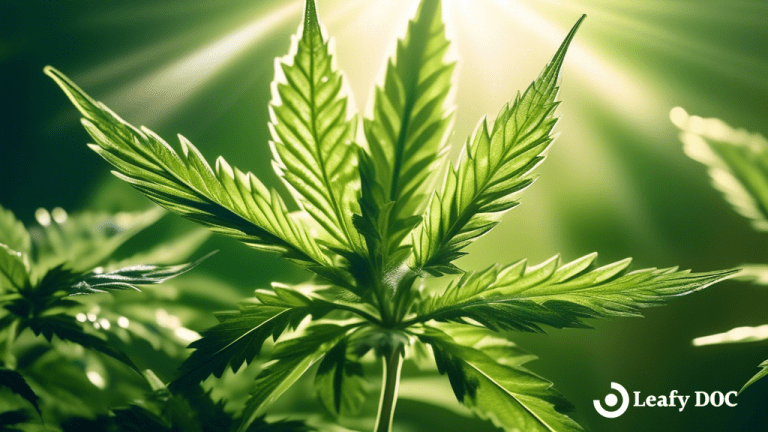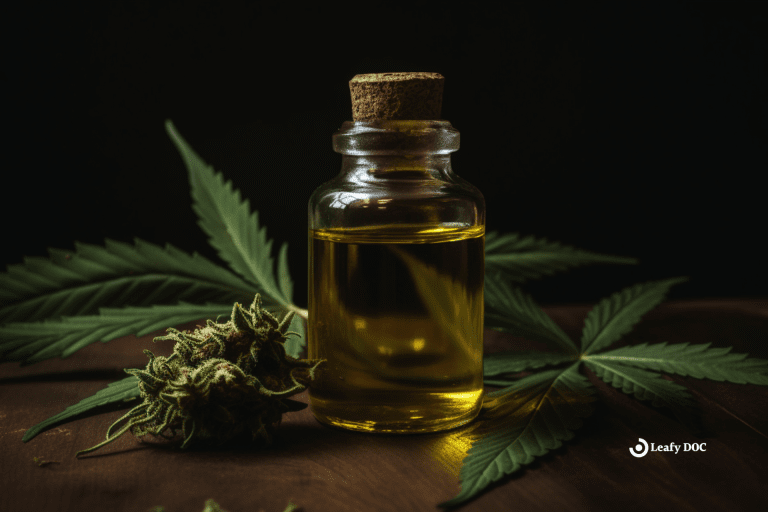Jaundice
Can medical cannabis help with the symptoms of Jaundice? Find out more below.
What is Jaundice?
Jaundice is a medical condition that results from the buildup of a yellow pigment called bilirubin in the blood. Bilirubin is produced when the liver breaks down old red blood cells. Typically, the liver filters the bilirubin out of the blood and excretes it into the intestines through bile ducts. However, if the liver is not functioning correctly or there is an obstruction in the bile ducts, bilirubin can build up in the blood and cause the skin and whites of the eyes to turn a yellow color. Jaundice can cause other symptoms such as fatigue, abdominal pain, nausea, and dark urine.
There are several types of jaundice, including pre-hepatic, hepatic, and post-hepatic. Pre-hepatic jaundice occurs when red blood cells are excessively broken, increasing bilirubin production. Hepatic jaundice occurs when there is damage to the liver that prevents it from adequately filtering bilirubin out of the blood. Post-hepatic jaundice occurs when there is an obstruction in the bile ducts, which prevents bilirubin from being excreted into the intestines. Treatment for jaundice depends on the underlying cause and may include medications, surgery, or lifestyle changes.
What causes Jaundice?
Pre-hepatic Jaundice: This type of jaundice occurs when red blood cells are excessively broken. When red blood cells break down, hemoglobin is released and converted into bilirubin in the spleen. However, if there is a high rate of red blood cell breakdown, the liver may be unable to filter out all of the bilirubin, leading to a buildup in the bloodstream. Causes of pre-hepatic jaundice include hemolytic anemia, sickle cell anemia, malaria, and other blood disorders.
Hepatic Jaundice: This type of jaundice occurs when there is damage to the liver that prevents it from functioning properly. Causes of hepatic jaundice include hepatitis, liver cirrhosis, alcoholic liver disease, and liver cancer. When the liver is damaged, it cannot correctly filter bilirubin out of the bloodstream, leading to a buildup in the body.
Post-hepatic Jaundice: This type of jaundice occurs when there is an obstruction in the bile ducts, preventing bilirubin from being excreted into the intestines. Causes of post-hepatic jaundice include gallstones, tumors, and inflammation of the bile ducts. When the bile ducts are blocked, bilirubin backs up into the bloodstream and causes jaundice.
In some cases, jaundice may be a symptom of an underlying medical condition that requires treatment. It is essential to consult a healthcare provider if you experience symptoms of jaundice, such as yellowing of the skin or eyes, fatigue, abdominal pain, or dark urine. Treatment for jaundice depends on the underlying cause and may include medications, surgery, or lifestyle changes.
Are there Signs & Symptoms?
The primary symptom of jaundice is the yellowing of the skin and whites of the eyes, which is caused by a buildup of bilirubin in the bloodstream. Other symptoms of jaundice may include:
- Dark urine: Bilirubin is excreted in the urine, and urine may appear dark in color when levels are high.
- Pale stools: When bile flow is blocked, stools may appear pale or gray.
- Itchy skin: Excess bilirubin in the bloodstream can cause itching.
- Abdominal pain: Jaundice can be accompanied by pain in the upper right quadrant of the abdomen.
- Fatigue: Excess bilirubin can make you feel tired or weak.
- Loss of appetite: Jaundice can cause a loss of appetite and weight loss.
- Nausea and vomiting: Sometimes, jaundice can cause nausea and vomiting.
Diagnosis & Treatment Options
Diagnosing jaundice usually involves a physical examination, blood tests, and imaging studies.
The physical examination includes assessing the skin and eyes for yellowing and checking for other signs of liver disease, such as a swollen abdomen, spider-like blood vessels, or an enlarged liver. Blood tests are used to measure levels of bilirubin, liver enzymes, and other markers of liver function. Imaging studies such as an ultrasound or CT scan may be ordered to evaluate the liver and bile ducts.
The treatment of jaundice depends on the underlying cause. If an obstruction in the bile duct causes jaundice, surgery may be necessary to remove the blockage. If the reason is viral hepatitis, antiviral medications may be prescribed. For those with liver disease, lifestyle modifications such as reducing alcohol consumption and maintaining a healthy weight may be recommended. In severe cases, liver transplantation may be necessary.
Additionally, treatment for jaundice often involves managing symptoms such as itching or fatigue. This may include medications such as antihistamines, pain relievers, or measures such as avoiding certain foods that may exacerbate symptoms. It is essential to work closely with a healthcare provider to determine the underlying cause of jaundice and develop an appropriate treatment plan.
Can medical cannabis help?
Currently, limited scientific evidence supports the use of medicinal cannabis to treat jaundice. While some studies have suggested that certain compounds found in cannabis, such as cannabidiol (CBD), may have antioxidant and anti-inflammatory effects that could potentially benefit liver health, there is little research specifically focused on the effects of cannabis on jaundice.
Furthermore, the use of medicinal cannabis for any condition is highly regulated and often requires a prescription from a healthcare provider. In some cases, cannabis-based medications may be recommended to treat symptoms associated with certain liver diseases, such as nausea or loss of appetite. However, the use of these medications for jaundice specifically would depend on the condition’s underlying cause and would need to be evaluated on a case-by-case basis.
Overall, while some research suggests that medicinal cannabis may have potential benefits for liver health, further studies are needed to determine the safety and efficacy of its use for the treatment of jaundice or any other liver condition. Individuals with jaundice need to work closely with their healthcare provider to develop an appropriate treatment plan based on the underlying cause of their condition.
Last Updated: June 14, 2024
Get Your Medical Card
Connect with a licensed physician online in minutes
Table of Contents
Keep Reading
-
Unlocking Creativity With Terpenes In Cannabis
Unleash Your Inner Artist: Uncover the Power of Terpenes in Cannabis for Unlocked Creativity. Learn How to Ignite Imagination and Boost Inspiration Today!
-
Refreshing Cannabis-infused Beverage Recipes To Try
Indulge in a selection of refreshing cannabis-infused beverage recipes for an elevated experience. Try these delicious drinks today and treat yourself to a rejuvenating sip of relaxation!
-
The Best Method For Making CBD Oil
Unlock the Secrets of Crafting Top-Quality CBD Oil – Click Now!



